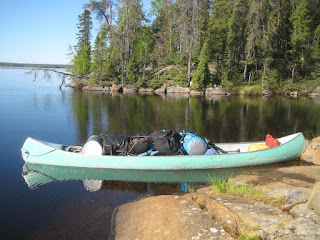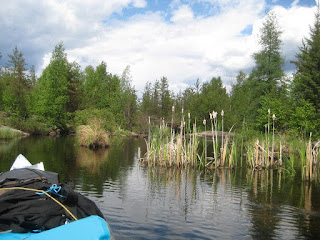Grumman canoe packed to leave early morning June 6 at Camp 1. I have not used this canoe for over 10 years and it will take some getting used to, both in packing and in handling in the water. It definitely does not pack as well as my Clipper 5 m (17') Prospector canoe, the gear not sitting as low. The Grumman handles like a tank compared to the Clipper. It takes me a lot longer to break camp than it will later when I get back in a routine. I arise before 4 am when "Wilson" my alarm clock rings. I prefer to rise early and stop early to have the next camp set up well before dark.
I start the season with a short haircut.
American white pelicans are encountered soon. I continue to see many pelicans all season. They look so awkward in the water, but soar gracefully and majestically aloft. There are also many ducks, some mallards, but mostly common goldeneyes with the distinctive in-flight whistling sound made by their wings.
The first portage, a short 100 metre carry bypassing small rapids and beaver dam.
I see my first beaver, bald eagle and chipmunk.
Soon after I stop for lunch, and do a stupid thing. While walking to the canoe to leave, I am carrying too many loose items across boulders at shore and drop the compass in the lake. Aie! At first I think it has descended out of reach, but when the water clears I am just able to retrieve it at arm's limit, getting my shirt wet at the shoulder. It stops on a boulder so I have to be careful not to push it off into deeper water. Stupid, stupid! Aie! I now place such loose items into a mesh carry bag to help prevent such accidents. A compass is absolutely necessary in many waters to properly orient canoe with topographical map to find the correct route. I do carry a spare small compass, not nearly as effective as the larger Suunto one.
A male red-winged blackbird, already singing its heart out with the characteristic trill to recruit mates and establish a nesting area.
The second 100 metre portage bypasses another short rapid.
As I enter the next lake, the weather turns to rain and I start looking for a campsite. I check two possible campsites but they are not suitable, even heading back to look at one spot. It seems that this lake may have nothing very suitable, so I don raingear and head north again, stopping at two islands with no luck.
At the next 100 metre portage, I am greeted by a bald eagle in a tree overlooking the rapids and falls. I walk to the far end hopefully finding a good campsite. Yeah ... there is! These photos are of the magnificent evening sunset casting a rosy hue to the clouds overlooking the outlet into the next lake. The temperature has warmed to about 20℃ so I erect the nylon tent rather than the canvas one. I have travelled 15 km, including three 100 metre portages. All the portages are in good shape and do not require any clearing.
The next day, the skies have cleared and it is a beautiful sunny day.
I catch two nice walleye for supper, and catch and release two pike. I only use barbless hooks which make it easier to safely release fish, and are just as effective as the barbed type. There is no suitable place to fish from shore, so I canoe out into the lake and cast the lure near the falls and lower rapids.
In the 2016 season, the top section of my fishing rod had broken but the shorter rod still functioned well. At the end of last year another section broke but I thought I had it mended well enough with (of course) duct tape. On using it now, that section fails badly so I am down to the bottom three sections (which continue to perform admirably all season).
As usual, as soon as I catch a fish, a gull shows up looking for handouts. It is amazing how they appear seemingly from nowhere. However, I throw the guts of filleted fish out into deeper water where usually gulls cannot retrieve them. I do not want to leave remnants on shore which may attract bears.
Pelicans are commonly found near rapids and falls. In the bay below the falls there are several goldeneye ducks, and a beaver swims by camp several times during my stay, slapping his tail and diving to vent his displeasure at my presence.
Along the last portage, I gather enough dandelion leaves, flowers and stems for supper salad, a welcome addition after picking birch leaves at the previous camp.


































